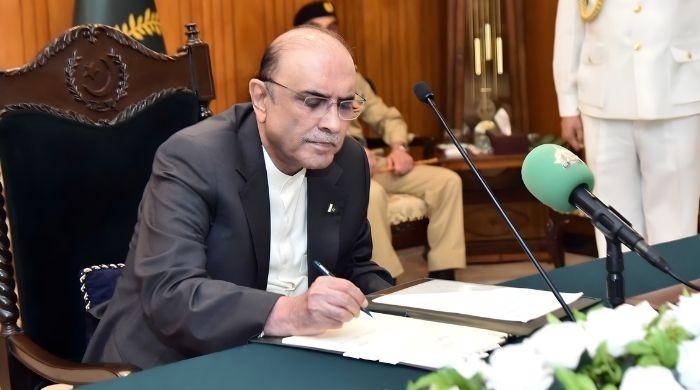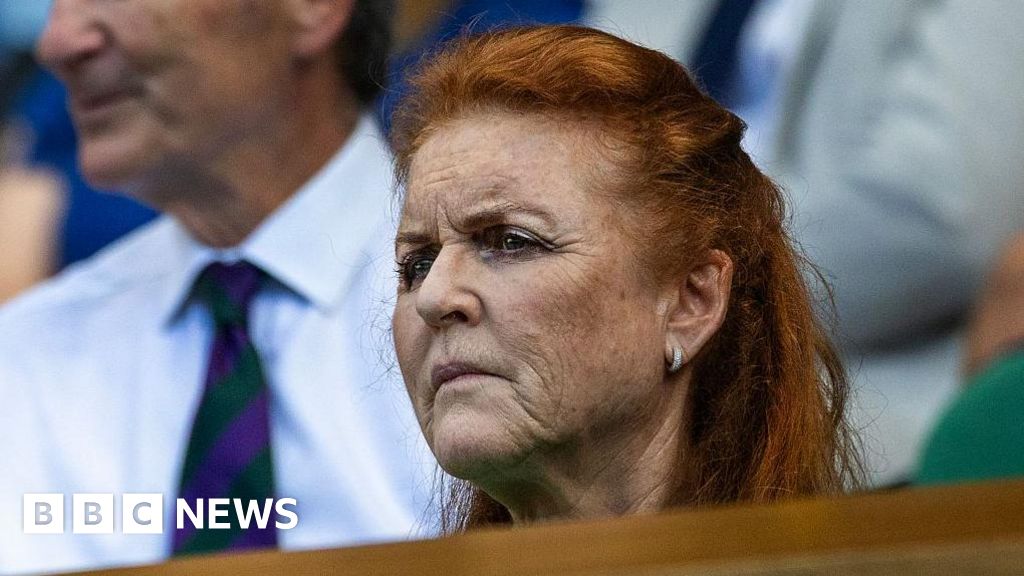Entertainment
President Zardari assents 27th Constitutional Amendment to law after parliament’s approval

- President gives assent to bill on PM’s advice.
- Assent given to bill after nod from both houses.
- Senate greenlights bill after changes by NA.
ISLAMABAD: President Asif Ali Zardari on Thursday gave assent to the much-debated 27th Constitutional Amendment after approval from the Parliament.
With the president’s signature, the amendment has now officially become part of the Constitution.
“The Constitution (Twenty-Seventh Amendment) Bill, 2025 is assented to, as advised by the Prime Minister [Shehbaz Sharif], at Para-5 of the Summary,” read a notification issued by the President’s House.
The development came moments after the Senate approved the amendment bill following changes approved by the National Assembly a day earlier, amid noisy protests by the opposition.
Federal Minister for Law Azam Nazeer Tarar presented the constitutional amendment bill today, with the tweaks to the draft earlier approved by the upper house. The amendment bill received 64 votes (two-thirds majority in the 96-member House) in favour and four against.
Senate Chairman Yousuf Raza Gilani announced the result, saying: “So the motion is carried by the votes of not less than two-thirds of the total membership of the Senate, and consequently, the bill stands passed.”
The much-touted bill was initially presented in the upper house of parliament on Monday and got a nod on the same day. It was then referred to the NA, which approved it with some amendments. Therefore, the legislation was again presented in the Senate today to approve the latest changes.
New tweaks
A day earlier, the National Assembly passed the amendment bill that seeks to change the judicial structure and military command, with 234 votes in favour and four against amid the opposition’s walkout. It included eight amendments — not part of the Senate-approved previous version — aimed at clarifying the chief justice’s position.
The amended bill fine-tunes the structure of the newly established Federal Constitutional Court (FCC), clarifies the titles and ranking of the country’s top judges, and drops several clauses from the Senate-approved draft that had sought to alter oath-related provisions for various constitutional offices.
One of the most significant updates relates to Clause 2, which modifies Article 6(2A) of the Constitution — the article concerning high treason. The National Assembly’s version adds the term “Federal Constitutional Court” after “the”, thereby explicitly including the new court within the ambit of Article 6. The earlier Senate draft had not mentioned the court by name.
The lower house also introduced a fresh Clause 2A to amend Article 10(4), which deals with preventive detention. This revision adds the words “Supreme Court” within the explanatory portion of that article.
Meanwhile, the National Assembly deleted several provisions that had appeared in the Senate’s version. Clauses 4, 19, 51, and 55 — which collectively proposed to modify the wording of oaths administered to a range of constitutional officeholders — were removed from the final text.
Clause 4 had aimed to revise Article 42, under which the president takes the oath of office before the Chief Justice of Pakistan, by substituting the phrase “Chief Justice of Pakistan” with “Chief Justice of the Federal Constitutional Court.”
Likewise, Clause 19 proposed changes to Article 168, which regulates the appointment and oath of the Auditor General of Pakistan. It would have added the term “Supreme Court” before “Chief Justice of Pakistan,” thereby slightly altering the formal oath text.
Clause 51 mirrored this approach for Article 214, which requires the Chief Election Commissioner to take the oath before the Chief Justice. The Senate draft suggested replacing this with “Chief Justice of the Federal Constitutional Court.”
Similarly, Clause 55 sought to amend Article 255(2), which applies in cases where an oath cannot be administered before the designated official. At present, the Chief Justice of Pakistan can nominate another person; the Senate version proposed transferring this authority to the Chief Justice of the Federal Constitutional Court.
All of these oath-related proposals were ultimately omitted by the National Assembly.
Another key modification came in Clause 23, which amends Article 176 to include a proviso specifying that, “notwithstanding anything contained in the Constitution, the incumbent Chief Justice shall continue to be known as the Chief Justice of Pakistan during his term in office.”
A further addition was made under Clause 56, which now defines the “Chief Justice of Pakistan” as “the senior among the Chief Justice of the Federal Constitutional Court and the Chief Justice of the Supreme Court,” thereby establishing a formal hierarchy between the two judicial heads.
The multi-clause amendment bill required a two-thirds majority in the 336-member House. The ruling coalition easily secured the required votes, with the PML-N holding 125 seats, the PPP 74, the MQM-P 22, the PML-Q four, the Istehkam-e-Pakistan Party four, and one seat each held by the PML-Z, the Balochistan Awami Party, and the National Peoples Party.
However, four members from the JUI-F, once a close ally of the ruling PML-N, were the only lawmakers to register their votes against the amendments.
Entertainment
Tyra Banks didn’t visit Miss J. Alexander after stroke left him paralysed

Miss J. Alexander had all but one of his America’s Next Top Model family by his side when he suffered a life-altering illness.
In Netflix’s bombshell new docuseries Reality Check: Inside America’s Next Top Model, the longtime ANTM runway coach shared that he suffered a stroke on December 27, 2022 — one that left him paralyzed from the waist down.
“I had a stroke. I woke up, I didn’t know where I was, other than the hospital,” Miss J said in the series finale. “I spent five weeks in a coma, and I couldn’t walk. I couldn’t talk. I thought to myself, what was I going to do?”
Jay Manuel and Nigel Barker — his former ANTM co-judges — showed up during his recovery, but when asked if Tyra Banks visited, Miss J responded, “No, not yet. She just sent me a text that she wants to come and visit me. But, no, not yet.”
The reunion with Manuel and Barker was emotional. “I thought back to how we used to do shows together. I cried because I just missed them so much,” Miss J recalled.
Still, the fashion icon remains determined. “I miss being the queen of the runway. The catwalks, of course,” he said. “I taught models how to walk, and now I can’t walk — not yet! Not yet. I’m determined to walk… It’s not over for me yet.”
Entertainment
China’s humanoid robots take centre stage for Lunar New Year showtime

China’s most-watched TV show, the annual CCTV Spring Festival gala, on Monday showcased the country’s cutting-edge industrial policy and Beijing’s push to dominate humanoid robots and the future of manufacturing.
Four rising humanoid robot startups — Unitree Robotics, Galbot, Noetix and MagicLab — demonstrated their products at the gala, a televised event and touchstone for China comparable to the Super Bowl for the United States.
The programme’s first three sketches prominently featured humanoid robots, including a lengthy martial arts demonstration where over a dozen Unitree humanoids performed sophisticated fight sequences, waving swords, poles and nunchucks in close proximity to human children performers.
The fight sequences included a technically ambitious one that imitated the wobbly moves and backward falls of China’s “drunken boxing” martial arts style, showing innovations in multi-robot coordination and fault recovery — where a robot can get up after falling down.
The programme’s opening sketch also prominently featured Alibaba’s AI chatbot Doubao, while four Noetix humanoid robots appeared alongside human actors in a comedy skit, and MagicLab robots performed a synchronised dance with human performers during the song “We Are Made in China”.
Ipos planned
The hype surrounding China’s humanoid robot sector comes as major players including AgiBot and Unitree prepare for initial public offerings this year, and domestic artificial intelligence startups release a raft of frontier models during the lucrative nine-day Lunar New Year public holiday.
Last year’s gala stunned viewers with 16 full-size Unitree humanoids twirling handkerchiefs and dancing in unison with human performers.
Unitree’s founder met President Xi Jinping weeks later at a high-profile tech symposium – the first of its kind since 2018.
Xi has met five robotics startup founders in the past year, comparable to the four electric vehicle and four semiconductor entrepreneurs he met in the same timeframe, giving the nascent sector unusual visibility.
The CCTV show, which drew 79% of live TV viewership in China last year, has for decades been used to highlight Beijing’s tech ambitions, including its space programme, drones and robotics, said Georg Stieler, Asia managing director and head of robotics and automation at technology consultancy Stieler.
“What distinguishes the gala from comparable events elsewhere is the directness of the pipeline from industrial policy to prime-time spectacle,” Stieler said.
“Companies that appear on the gala stage receive tangible rewards in government orders, investor attention, and market access.”
China’s strengths
Behind the spectacle of robots running marathons and executing kung-fu kicks and backflips, China has positioned robotics and AI at the heart of its next-generation AI+ manufacturing strategy, betting that productivity gains from automation will offset pressures from its ageing workforce.
“Humanoids bundle a lot of China’s strengths into one narrative: AI capability, hardware supply chain, and manufacturing ambition. They are also the most ‘legible’ form factor for the public and officials,” said Beijing-based tech analyst Poe Zhao.
“In an early market, attention becomes a resource.”
China accounted for 90% of the roughly 13,000 humanoid robots shipped globally last year, far ahead of US rivals including Tesla’s Optimus, according to research firm Omdia.
Morgan Stanley projects that China’s humanoid sales will more than double to 28,000 units this year.
Elon Musk has said he expects his biggest competitor to be Chinese companies as he pivots Tesla toward a focus on embodied AI and its flagship humanoid Optimus.
“People outside China underestimate China, but China is an ass-kicker next level,” Musk said last month.
Entertainment
Cardi B flaunts tattoos after onstage fall during Little Miss drama tour

Cardi B brought her signature bold style to the stage as her Little Miss Drama tour continues to sell out arenas.
The rapper stunned fans in a hot pink dress featuring a daring high slit, a plunging neckline, and subtle side cutouts that highlighted her tattoos while adding a sensuous edge to the look.
The Bodak Yellow hitmaker took to Instagram to put up a video of herself posing to Rihanna’s James Joint.
The clip instantly became viral.
Fans praised her confidence and glamour, with many commenting on how “pretty” she looked and applauding her fearless fashion choices.
Her striking outfit came around the time the rapper made headlines for her fall on stage at her tour stop in Las Vegas.
While performing her track Thotiana at T Mobile Arena on February 13, the rapper took a tumble off a chair mid routine.
The fall was minor, but Cardi quickly turned it into a viral moment with her trademark humor.
After finishing the song, she quipped to the crowd, “That was the government!” which was a playful jab that came after she had recently traded words online with the Department of Homeland Security.
-

 Business6 days ago
Business6 days agoAye Finance IPO Day 2: GMP Remains Zero; Apply Or Not? Check Price, GMP, Financials, Recommendations
-

 Fashion6 days ago
Fashion6 days agoComment: Tariffs, capacity and timing reshape sourcing decisions
-

 Tech7 days ago
Tech7 days agoRemoving barriers to tech careers
-

 Fashion6 days ago
Fashion6 days agoADB commits $30 mn to support MSMEs in Philippines
-

 Entertainment6 days ago
Entertainment6 days ago‘Harry Potter’ star David Thewlis doesn’t want you to ask him THIS question
-

 Sports6 days ago
Sports6 days agoWinter Olympics opening ceremony host sparks fury for misidentifying Mariah Carey, other blunders
-

 Fashion4 days ago
Fashion4 days ago$10→ $12.10 FOB: The real price of zero-duty apparel
-

 Fashion6 days ago
Fashion6 days agoSaint Laurent retains top spot as hottest brand in Q4 2025 Lyst Index






